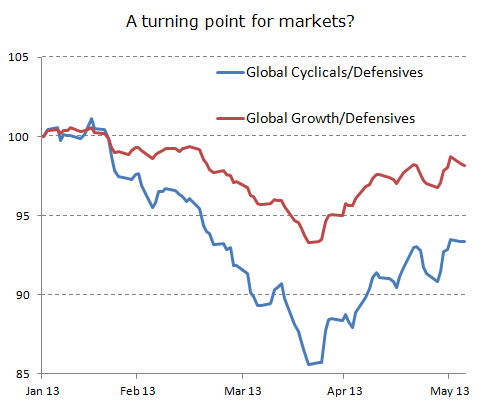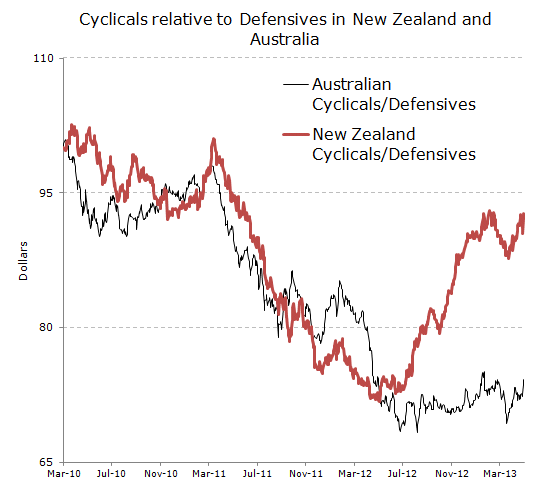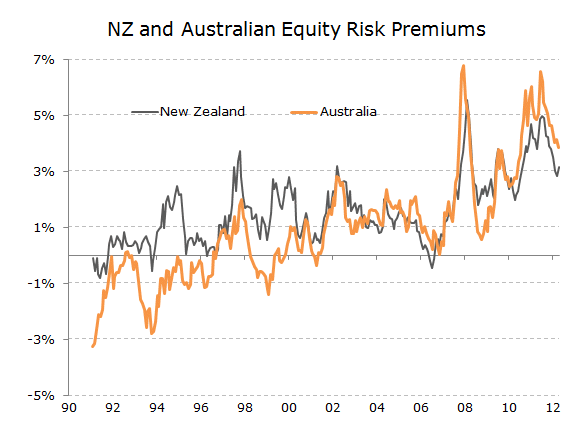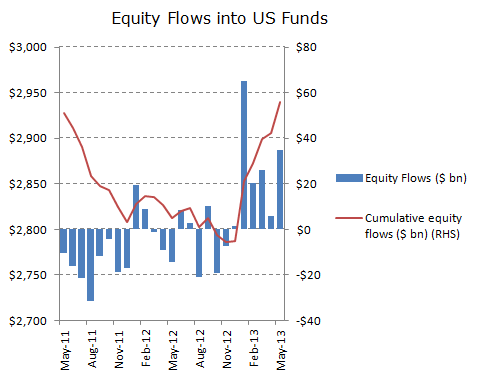Harbour Asset Management: Another turning point for markets
A mild fall is no indication that investors should move away from equity markets.
Friday, June 7th 2013, 12:30PM
by Harbour Asset Management
Global equity markets witnessed an increase in volatility in May, principally due to bond markets reacting to new talk of the potential for the US Federal Reserve to begin “tapering” their bond purchase programme. The sell-off in bonds was matched by a significant reversal in defensive versus cyclical stocks. Many global equity markets actually still managed a respectable local currency return in May, although the strength of the US dollar meant that the global equity benchmark was flat for the month.
The listing of Mighty River Power and a raft of further corporate activity marked the New Zealand equity calendar. The New Zealand market under-performed global markets, in part reflecting the defensive characteristics of the market. The “digestion” of equity supply might also partly explain the under-performance of the New Zealand market in the month. The New Zealand market fell 2.2% in May.
A key feature of the month was a significant rise in the dispersion of returns. On the one hand “growth” stocks like Kathmandu, Fisher & Paykel Healthcare, Diligent, and Ryman Healthcare had returns more than 10% above the market, whereas Telecom, Chorus and the Australian banks under-performed by more than 10%. Some stocks also had downgrades to earnings and were significantly marked down – for instance GPG, Nuplex, and Skellerup all fell sharply. Industry days for Telecom and Fletcher Building also saw some analyst earnings downgrades.
The Australian market pulled back sharply in May, down 4.5% in Australian dollars, and fell 12.1% in US dollars, as the Australian dollar fell sharply. Weaker data, a cut in interest rates and a correction in bank shares all contributed to the Australian market weakness. Again the Australian market saw a major dispersion in sector returns. Financials fell 8.4%, while resource and energy companies were up 2.5%.
Over the last 6 months or so the market has been fixated on the fact that the equity rally to-date has been yield focussed.
Moreover some yield stocks have appeared “stretched” prompting some commentators to say the market is in a bubble and that the rally has been “no better than kissing you sister” .
The truth is that over 50% of the total return from stocks over the long term has come from dividends, and while it may seem uncomfortable to witness a rally in defensive yield stocks, the fact is that global interest rate policies are encouraging markets to re-price yield across all asset classes.
However, May 2013 probably shunted markets into another phase. While most commentators have examined in detail the machinations of the bond market selling off and equity markets rising, perhaps the most important trend in May has been the switch within equity markets.
In the month, cyclical and growth stocks continued to out-perform defensive stocks. The final end game of contrived or naturally low real interest rates is that they encourage everyone to take on more risk. Initially this has been expressed by investors buying into “quality, defensive and higher yielding stocks”. However, in late April and throughout May investors showed a greater willingness to move further into growth or cyclical sectors.

Source: Harbour and Bloomberg
The shift in market focus, with bond yields responding more to data and Central Bank speak, is likely to bring about greater market volatility. Recently we have seen more days with an equity market move of greater than 1%. For a time this rise in volatility may scare investors back into defensive stocks, or stocks with high yield. However, we think that markets are signalling a further turning point. And while this turning point into cyclicals was evident in New Zealand about 6 months ago, we expect signs of a similar change in Australia in the next 6-12 months as the impact of policy easing begins to impact on markets.

Source: Harbour, Bloomberg
And so we remain biased to sell bonds into any rally and buy equities into any sell-off. While globally, markets saw bond yields rise and equity prices rise, in both New Zealand and Australia the equity markets fell as bond yields rose. Our take is that this mild fall in New Zealand and Australian equities may provide a good opportunity to continue to edge (or average) into equity markets.
Our view reflects a number of factors.
1. First we do not think that either New Zealand or Australian equities look expensive (nor are they in any sort of bubble territory) .
2. Secondly, equities still look cheap relative to bonds. We think it would take a rise in yields of more than 1% to alter that outlook. The 40 basis point (0.4%) rise in New Zealand bond yields may have provided a signal to get some investors to consider growth and cyclical shares over defensive sectors, but it is unlikely to unsettle a broader long term switch from fixed interest to equities. The equity risk premium remains elevated.

Source: Harbour and UBS
3. Central banks are not about to actually raise interest rates. Interest rates are staying low for some time and liquidity is plentiful. Central banks are still actually fighting the threat of deflation. Additionally, historically equities still perform reasonably well after the first tightening of policy, particularly when interest rates rise because growth is strengthening as opposed to inflation rising.
4. Global growth is still positive, with the consensus for 2013 world GDP growth hovering around 2.5%, about the same growth rate as 2012. In fact, US economic data was on average better in May than April (particularly housing and consumer data) and the Global Economic surprise index appears to be lifting again as markets adjust to lower expectations.

Source: Bloomberg, Citigroup Economic Surprise Indices
5. New Zealand economic growth is clearly strengthening. Business and consumer confidence remain firm, and building activity is strengthening. We would expect employment activity to continue to improve and therefore real income growth to lift. It seems that the Reserve Bank are unlikely to shut off the recovery through aggressive tightening, although expectations of a rise in rates sometime in early 2014 have lifted. Once again this is not a threatening environment for the equity market.
6. Finally, flows into equities appear to be rising globally. Flows into equities have lifted significantly this year. In the US, net inflows have averaged $31bn a month this year, after averaging net monthly inflows of $9bn last year, and outflows of $5bn in 2011.
Outlook – more volatility but still supportive of equities
The news on the Federal Reserve moving to potentially taper their bond purchases has rattled the bond market. The easy trade of buying yield stocks has also been unsettled. The rise in bond yields gives cause for investors to consider their equity sector positions. And policy uncertainty may lift volatility in markets, especially after the consecutive months of equity prices rising.
We think equity weakness should be used to continue to average into markets. While we can be concerned about risks such as a slower outlook for Chinese growth, or a further bout of European stress (perhaps centred on France), the fact is that interest rates are likely to stay very low for the foreseeable future.
Meanwhile, New Zealand corporates are generally well placed with New Zealand growth still gradually picking up.
Important disclaimer information
| « Pathfinder Monthly Commentary: Death and taxes – how certain are they? | Hamish Douglass Unplugged - Latest Video from Adviser Briefing - August 2012 » |
Special Offers
Comments from our readers
No comments yet
Sign In to add your comment
| Printable version | Email to a friend |









